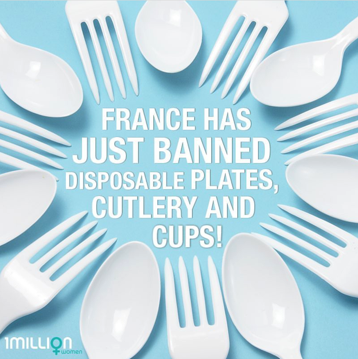I’m an optimist. I’m seeing signs that the world is cottoning on to the need to change the way we brazenly consume and consume and consume.

Almost seven years ago I (outrageously!) suggested we all eat 6-9 teaspoons of sugar. And stop drinking fruit juice. What do you know, the World Health Organisation came out in late last year with the same edict.
The fringes and I have been banging on about toxins and plastics and waste and stuff that just makes the world a lesser place.
But it seems the Powers That Be are starting to catch up to the fringe. The world is moving faster in general. This makes sense. Information gets out faster and everything is more transparent. This is great stuff, when harnessed.
(PS: A fortnight ago I really went to town on the ecological hypocrisies of the wellness industry if you feel like an extra read. And last week I shared a list of eight bits of plastic you can quit right now.)
What do you think of these shifts?
The US bans toxic hand wash
The USFDA (Food and Drug Administration) recently released its decision on banning 19 active ingredients in antibacterial soaps. The ruling, 40 years in the making, caps a very lengthy debate over whether these chemicals are safe and offer any advantage over ordinary soap.
The ban includes the most widely used antiseptic in hand soaps, triclosan, which studies suggest has the potential to disrupt hormones in the body, trigger allergies and be associated with some types of cancer.
Great news. (About the ban.)
But bear in mind…
While these antimicrobial chemicals are now banned in antibacterial soaps, they’re still almost everywhere. Think mouse pads, your kitchen countertops, shopping carts, shoe insoles, socks and toothbrush covers. And it’s not the FDA’s job to regulate those kinds of products. In these non-food products, antimicrobials are used to preserve the material rather than to protect consumers from germs, so they’re considered pesticides and thus fall under a different governmental department.
And there’s a catch…
Makers of these particular pesticides are exempt from the labelling requirements…so you’ll never actually know whether your socks contain triclosan!
So we still have a way to go…
France bans plastic cutlery
As I shared last week, France has just banned plastic cutlery, cups and plates. (150 single-use cups are thrown away every second in France.) They’re aiming to cut landfill waste in half by 2025 and reduce greenhouse emissions 40 per cent by 2030.
So, 50 per cent of the material going into takeaway cutlery will have to be organic by 2020. And up to 60 per cent by 2025.
They’ve also introduced similar bans on plastic bags and cotton buds.
San Francisco bans polystyrene
Yep, San Fran have banned the the sale of all polystyrene* food packaging, packing peanuts, take-away containers, coffee cups, foam dock floatings, mooring buoys and pool toys as of January 2017. And by July 2017, it’ll also be illegal to sell polystyrene fish and meat trays, like the ones you currently see in supermarkets. (Supermarkets have been given a longer time frame to phase these out, apparently…)
They’re well on their way to their goal of being a waste-free city by 2020.
*Although polystyrene is often better known as styrofoam, that’s actually just a trademarked brand name only referring specifically to the polystyrene foam used for thermal insulation and craft applications…not all of the other polystyrene we use on a daily basis.
Talcum powders and baby shampoo are on notice!
You might’ve followed the law suit filed against Johnson & Johnson after a woman developed ovarian cancer.
The first lawsuit was won in federal court against J&J. The plaintiff reported more than 30 years of talcum powder use, and the jury found that J&J had failed to warn consumers of the link between the use of their talc powders and an increased risk of ovarian cancer.
They’ve also recently admitted some of their baby products contain formaldehyde: a skin, eye, and respiratory irritant, and a known carcinogen (formaldehyde exposure has been specifically associated with leukemia).
Stay tuned. I think we’ll see more clampdown on these toxic products in the future. Meantime, feel free to avoid buying them!
Have you come across other initiatives or good signs recently?

